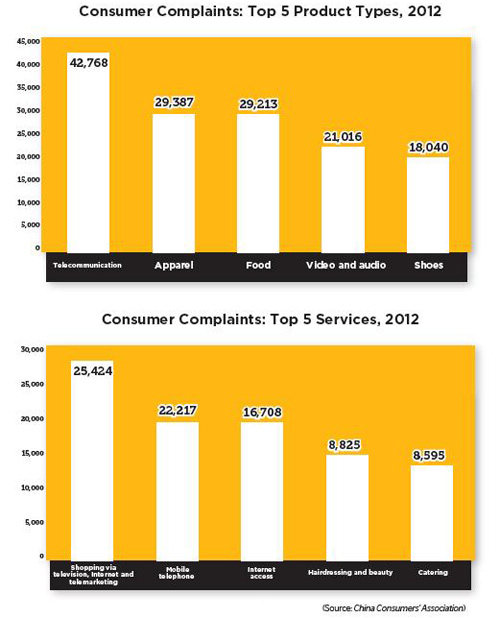Product woes demand more govt supervision
|
 |
China Consumers' Association (CCA), a nationwide organization that gathers consumer complaints and works to protect consumer rights, has received 543,338 complaints in 2012, ranging from quality and price issues to contracts and safety. No industry, it appears, was spared of complaints, including financial services, automotive and food. Among the total, 505,304 were addressed. Complaints on the quality of products accounted for 51.6 percent of all complaints, according to the CCA.
More supervision from the government is called for to improve the less-than-satisfying consumer environment, including increasing compensation levels and introducing class-action lawsuits into the legal system, says experts.
Beefing up supervision
While consumers need to take action and remain vigilant, the government should do more to protect consumer rights, says experts.
Food safety is a major concern for the country, with regular news reports of scandals, such as tainted milk, gutter oil used to cook foods, toxic capsules, exploding watermelons and the illegal use of banned additives and antibiotics.
Oversight in the food sector has long been criticized for being too scattered, too overlapped and too riddled with finger pointing.
For instance, from the time a chicken is raised on a farm to the time it reaches a dinner table, no less than five government departments are involved in the process, including the Ministry of Agriculture (MOA), the Ministry of Transport, the Ministry of Commerce, the Ministry of Health and the State Food and Drug Administration (SFDA).
A CCTV investigative report found that several Shandong-based farms fed excessive amounts of growth-boosting drugs to their chickens, but no ministry at the time stepped up to tackle the issue.
The SFDA said that an excessive use of antibiotics is a matter for the MOA. The MOA, on the other hand, claims that its responsibility lies only in the production process, and said the onus is on other ministries to deal with traces of antibiotics.
Analysts say it is imperative that the responsibilities of each department are clearly defined when it comes to ensuring food safety.
In response, China has decided to elevate the role of the SFDA. The proposed ministry-level General Administration of Food and Drug will be responsible for unified supervision on food and drug safety and quality during production, circulation and consumption. It will combine the functions of the existing State Council's Food Safety Office, the SFDA as well as the food supervision duties from the General Administration of Quality Supervision, Inspection and Quarantine and the State Administration for Industry and Commerce.
Another move is offering financial awards to citizens who inform the government of the malpractices of food companies. The State Council's Food Safety Commission established a system that earmarks financial rewards to whistle blowers, and last year 141,037 complaints on food safety were received. A total of 6,922 whistle blowers were financially rewarded, and the highest reward was 200,000 yuan ($32,200), according to the commission.
"As the next step, we will improve the incentive system, better protect whistle blowers and implement a national hotline," said Wang Xiaoyan, director of the coordination and guidance office under the commission.
A better legal system
Some consumers file lawsuits to protect their rights against less than savory products, but high costs deter many from taking legal action.
"Right now, the CCA receives about 500,000 cases every year, but that number can hardly compare to the total number of consumers whose rights have been infringed upon," says Qiu Jianguo, director of the complaints department at the CCA. "Statistics show that only 1 out of 20 people will file a complaint to the CCA or file a lawsuit when their rights are infringed upon. Why so? It's because of the high financial costs."
We recommend
Volkswagen to recall 380,000 cars in China
China demands Volkswagen to recall defective DSG cars
Apple unmoved by repairs complaints
Apple in guarantee scandal in China























